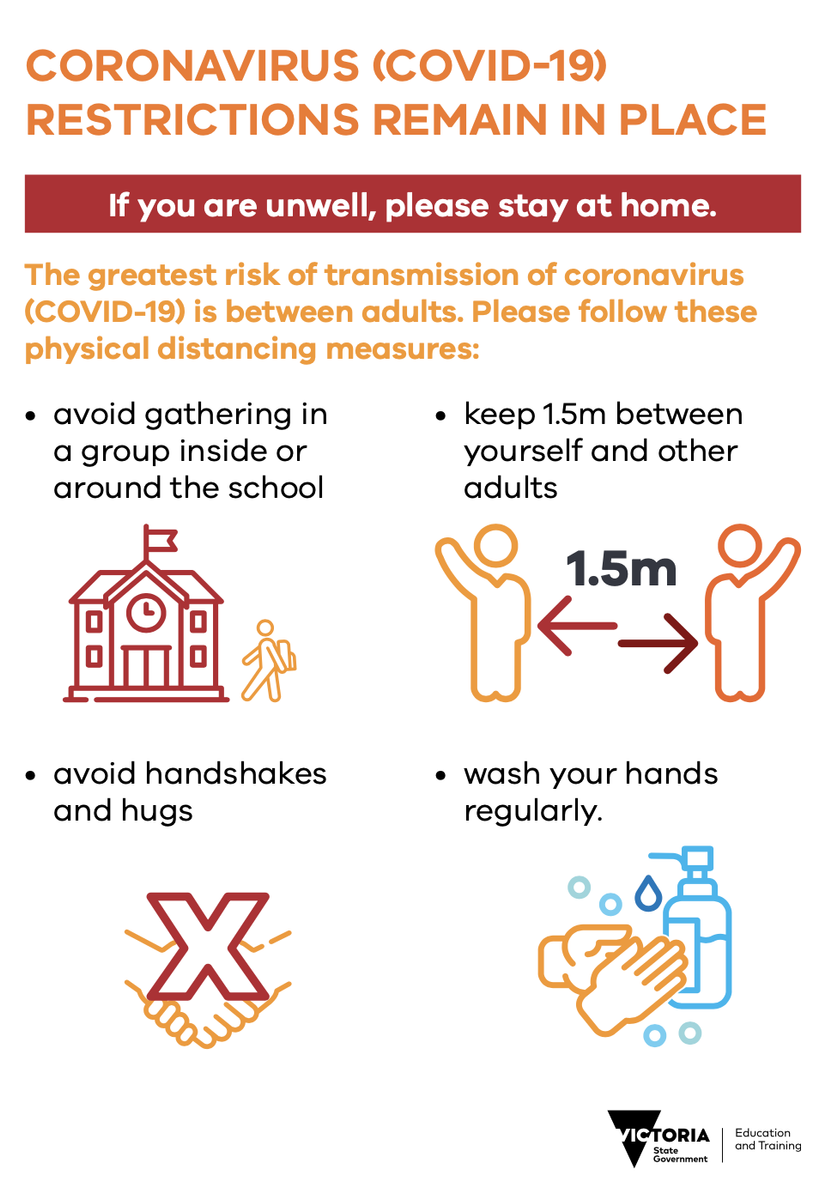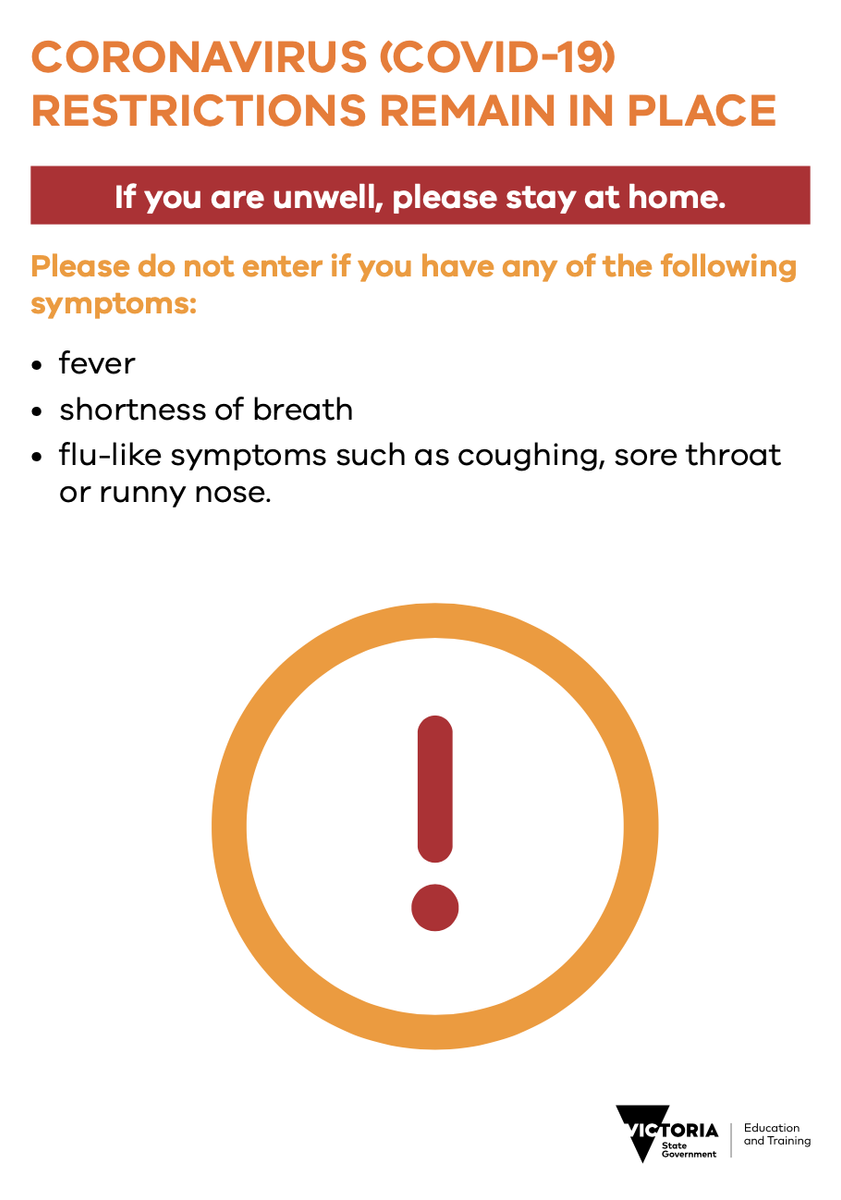Principal

We are all back!
What a delight to see all of our students back onsite, laughing, enjoying each other's company and settling back into their classrooms.
Everyone is getting used to sharing the space, washing their hands regularly and adapting to the changed play activities.
When we have visited classrooms there is a buzz of excitement and a focus on re-establishing classroom norms, focusing on well being and learning onsite again.
We want to thank all of our community for ensuring our students arrive at 8.45 am. Our staff are in classrooms from this time to greet students and enable them to settle well for their day of learning.
As the rest of the term unfolds we look forward to sharing more about how everyone is going back at school.
Safety around the school
Thank you to all in the community for supporting our drop off and pick up processes.
We are continuing to find the start of day very smooth. Our end of day processes are coming together now that everyone has returned. As indicated to the community we will monitor how this goes in our first week of everyone being back on site and then work out any changes that are required.
All in our community will have received a message via Sentral this week reminding them to be safe around the school.
- Students arrive at school from 8.45 am and enter via their allocated gate
- Students and adults should use the school crossings at all times - it might take a couple of minutes longer to get to your gate but you will be safe
- Our neighbours expect their driveways to be clear, therefore we should park only in designated spots around the school
- All cars should move in one direction - to the north down Almond Street in the morning and afternoon - this has been in place at BPPS for many years - it is important for traffic flow that we do not try and use Almond Street in both directions when dropping off and picking up students
- Our school driveway should be kept clear, U-turns into the driveway or parking across the driveway impacts entry
- Don't forget the 40 km per hour zone around schools
Please note that the local council has had parking infringement officers in the area. If you stop your car within the zone of a school crossing and they see you, there will be a fine coming your way in the post, so take care around the school.
Social Distancing
Thank you to everyone for maintaining social distancing when dropping off students or waiting for them after school.
Social distancing and hygiene will remain vital now that we have all returned to onsite learning. These posters are around the school and on the gates, everyone is responsible to follow the measures included.
If your child is unwell they cannot come to school, if they have any of these symptoms then they must stay home and you should seek medical advice.
Virtual School Tour
We are currently producing a virtual school tour of Boroondara Park PS. When it is completed it will go onto our website, we will also share it with the community. We are reviewing our Transition program and more details around Story Time, Information sessions and individual tours will be provided shortly.
Do you have a child who will be starting school in 2021? Download an enrolment form from our website, fill it in and return it to the office, we are taking enrolments for 2021 already.
Well being
This week I have included another handout from Michael Grose's Parenting Ideas website - Collaborative Parenting Style wins the day during Covid-19. Don't forget if you have particular topics you are interested in finding out about, please contact me and I will see what is available on the website.
This article talks about transitioning your child back to school.
In case you missed the information regarding webinars we have included them again this week.
Understanding techno tantrums (from Parenting Ideas website)
Many of us have witnessed our kids or teens emotionally combust when asked to switch off their gaming console or put their phone away. I colloquially call these ‘techno-tantrums’. Many of us fret that this signals that they’re ‘addicted’ to technology and find ourselves worrying about why they behave in such intense ways.
So, what makes technology so psychologically appealing for kids and how can we help them to unplug so that screen-time doesn’t end in scream time?
Technology is so appealing
Technology has been intentionally designed to cater for our kids’ most basic psychological drivers. As humans, our three most basic psychological needs are the need for connection, competence and control.
Technology caters for these needs in very clever ways. For example, our need for relational connection explains why many of our boys are obsessed with multi-player video games and girls are infatuated with social media. These online tools have also been designed to help young people experience competency- gamers see tangible measures of their performance by their levels of attainment, or battles won. Scrolling through YouTube and ‘selecting’ which video they’ll watch next also enables young people to experience a sense of control and agency over their lives – something they biologically crave.
Here’s what technology does to their brains and bodies
Digital technology impacts on children and young people in the following ways:
‘It feels good’
When our kids use a screen it’s usually a pleasurable experience for them. Their brains secrete the neurotransmitter dopamine, which makes them feel good. This means, when you demand that they turn the device off, you’re terminating their production of dopamine (pleasure response). It’s better to provide a choice of more appealing transition activities when you want them to move away from a screen. For example, suggest that they ride their bike, or walk the dog after they’ve switched off the device.
‘I want more’
The online world has no stopping cues, so our kids and teen never feel ‘complete’ or ‘done’. They can always refresh social media; continue to play to attain another level in a game; or watch another YouTube clip. This is also referred to as the state of insufficiency.One parenting tips that works is to give your children and teens hard end points. Rather than giving them a quantity of time (for example, you can watch an hour of TV today), give them the finish time (for example, I’d like you to switch off the TV at 4:30 pm).
‘It’s so novel’
Our brains are wired to seek out new and interesting stimulus. The online world is always instantly gratifying, fast-paced and requires minimal cognitive effort. In comparison the offline, real world doesn’t always offer novelty. The real world is a lot slower-paced, and it’s not always instantly rewarding and interesting like our kids’ digital world.
Ensure your kids and teens have ample time to experience boredom. Our brains were never designed to be switched on and processing information as they are in the digital world. Opportunities for boredom allow the brain time to reset and help our kids become accustomed to not always being ‘switched on’.
Susanne Lowe
Principal



